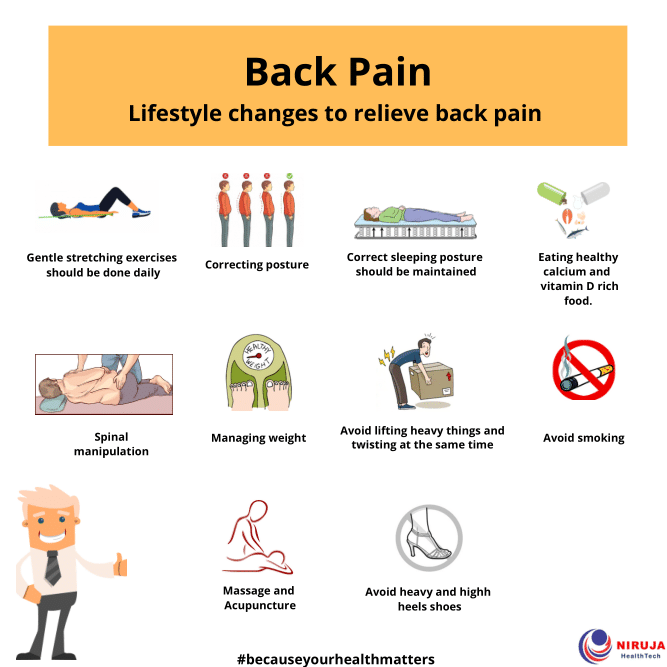
Back pain is a prevalent issue that can affect individuals of all ages, but it’s particularly common among adults and seniors. While there are numerous treatments available for back pain relief, adopting lifestyle changes can play a significant role in managing and preventing discomfort in the long run. In this blog, we will explore long-term strategies for back health, the benefits of regular exercise and weight management, and the importance of mental health and stress management.
Long-Term Strategies for Back Health
Making lifestyle changes can significantly impact your back health and overall well-being. Here are some key strategies to consider:
1. Adopt a Balanced Diet
A nutritious diet is crucial for maintaining a healthy body weight and supporting musculoskeletal health. Here are some dietary tips:
- Anti-Inflammatory Foods: Incorporate foods rich in omega-3 fatty acids (like salmon, walnuts, and flaxseeds), fruits, and vegetables to help reduce inflammation.
- Calcium and Vitamin D: These nutrients are essential for bone health. Include dairy products, leafy greens, and fortified foods in your diet.
- Hydration: Staying well-hydrated helps maintain the elasticity of spinal discs and supports overall bodily functions.
2. Regular Exercise
Regular physical activity is vital for strengthening muscles, improving flexibility, and supporting spinal health. Consider these exercise tips:
- Incorporate Strength Training: Focus on exercises that strengthen core muscles, as they play a key role in supporting your spine. Activities like planks, bridges, and abdominal exercises can be beneficial.
- Engage in Low-Impact Aerobic Activities: Walking, swimming, or cycling can enhance cardiovascular fitness while being gentle on the joints.
- Practice Flexibility Exercises: Stretching and flexibility routines, such as yoga or Pilates, can help improve posture and reduce muscle tension.
Benefits of Regular Exercise and Weight Management
Maintaining a healthy weight through regular exercise and a balanced diet is crucial for back health. Here are the benefits of managing your weight:
1. Reduced Stress on the Spine
Excess weight can place additional stress on the spine, leading to discomfort and pain. By maintaining a healthy weight, you can alleviate this pressure and promote spinal alignment.
2. Improved Muscle Support
Regular exercise helps strengthen the muscles that support the spine, providing better stability and reducing the risk of injury.
3. Enhanced Flexibility and Range of Motion
Incorporating flexibility exercises can help maintain a full range of motion in the spine, reducing stiffness and discomfort.
4. Better Overall Health
Regular physical activity and a healthy diet improve overall physical health, leading to increased energy levels, better sleep, and enhanced mood.
Importance of Mental Health and Stress Management
Mental health plays a significant role in physical health, and managing stress can be crucial in preventing and alleviating back pain. Here are some strategies for maintaining mental well-being:
1. Mindfulness and Relaxation Techniques
Practices such as meditation, deep breathing exercises, and progressive muscle relaxation can help reduce stress and tension, which can contribute to back pain.
2. Prioritize Sleep
Adequate sleep is essential for recovery and overall health. Establish a sleep routine, create a comfortable sleeping environment, and address any sleep issues to support back health.
3. Seek Support
Whether through friends, family, or mental health professionals, having a support system can help you manage stress and emotional challenges effectively.
4. Engage in Enjoyable Activities
Participating in hobbies and activities that bring you joy can alleviate stress and promote a positive mindset, contributing to overall well-being.
Conclusion
Managing and preventing back pain involves more than just immediate relief; it requires a holistic approach that incorporates lifestyle changes. By adopting a balanced diet, engaging in regular exercise, maintaining a healthy weight, and prioritizing mental health, you can create a strong foundation for back health. These long-term strategies not only help alleviate existing pain but also reduce the risk of future discomfort, enhancing your overall quality of life. Always consult with healthcare professionals before making significant changes to your exercise or diet, ensuring a tailored approach to your individual needs.

